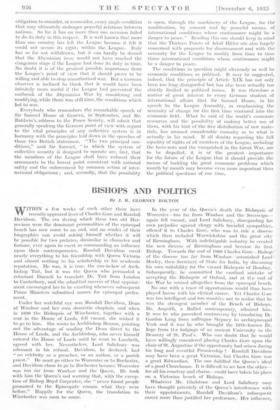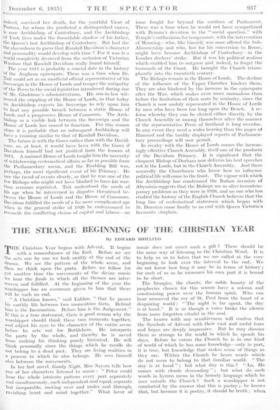BISHOPS AND POLITICS
By J. R. GLORNEY BOLTON
WITHIN a few weeks of each other there have recently appeared lives of Charles Gore and. Randall Davidson. The era during which these two old Har- rovians were the dominant personalities of the episcopal bench has. now come to an end, and no reader of their biographies can avoid asking hihiself whether it will be possible for two prelates, dissimilar in character and fortune, ever again to exert So commanding an influence upon • their contemporaries. Randall Davidson owed nearly everything to his friendship with Queen Victoria and almost nothing to his scholarship or his academie reputation. He was, it is -true, the son-in-law of Arch- bishop Tait, but it was the Queen who persuaded a reluctant Disraeli to translate Dr. Tait from London to Canterbury, and the admitted success of that appoint- ment encouraged her to be exacting whenever subsequent Prime Ministers submitted • names for episcopal prefer- ment.
Under her watchful eye was Randall Davidson, Dean of Windsor and her own domestic chaplain, and when in 1890 the Bishopric of Winchester, together with a seat in the House of • Lords, fell vacant, she wished it to go to him. She wrote to Archbishop Benson, pointing out the advantage of sending the Dean direct to the House of Lords, and the Archbishop, who never himself entered the House of Lords until he went to Lambeth; agreed with her. Nevertheless, Lord Salisbury was adamant in his refusal. Davidson, he declared, had no celebrity as a preacher, or an author, or a parish priest." He must go either to Worcester or to Rochester; and Davidson chose to go to Rochester because Worcester was too. far from Windsor and the Queen. • He took with him the Queen's sad warning that; with the excep- tion of Bishop Boyd Carpenter, she " never found people promoted to the Episcopate remain what they were before." Happily for the Queen, the translation to Winchester was soon to come. • • In the year of the Queen's death the Bishopric of .• Worcester—too far from Windsor and the. Sovereign-- again fell . vacant, and Lord Salisbury, disregarding his own prejudice against clergy with Socialist sympathies, offered' it to Charles Gore, who was. to rule a diocese which then included' Warwickshire and the great' city of Birmingham. With indefatigable industry he created the new diocese of Birmingham and became its first Bishop. Towards the end of 1908 Charles Gore—Bishop of the diocese too far from Windsor—astonished Lord Morley, then Secretary of State for India, by discussing his own suitability for the vacant Bishopric of .Bombay. Subsequently, he committed the cardinal _ mistake of accepting the -Bishopric of Oxford, and at the end of the War he retired altogether. from the episcopal bench. '- No one with a trace of opportunism would thus have played havoc with his clerical career. Yet Charles Gore was too intelligent and too sensitive not to realise that he was the strongest meniber of the Bench of Bishops. Mr. Asquith, a Balliol contemporary, admired him: It was he who provoked controversy by translating Dr. Gordon Lang from suffragan Stepney to archiepiscopal York and it was he who brought the little-known • Dr. Inge from UT e lodgings of an ancient University to the Deanery of St. Paul's. ' Who can doubt that he would have willingly considered placing Charles Gore upon the chair of St. Augustine if the opportunity-had arisen during his long and eventful. Premiership ? Randall Davidson may have been: a great Victorian, but Charles Gore was a great Edwardian. The one fulfilled the Queen's ideal of a good Churchman. It is difficult to see how the other— for all his courtesy and charm—could have taken his place on a Victorian bench of Bishops.
WhateVer Mr.. Gladstone and Lord Salisbury may have thought privately of the Queen's interference with their appointments, Randall Davidson's • subsequent career more than justified- her preference. Her influence, indeed, survived her death, for the youthful Vicar of 1.3 ortsea, for whom she predicted a distinguished career,' is now Archbishop of Canterbury, and the Archbishop of York lives under the formidable shadow of his father, the Queen's last Archbishop of Canterbury. But had she the shrewdness'to guess. that Randall Davidson's. 'character and personality would develop with time ? For it was in a Woiid completely divorced from the seclusion of Victorian • Windsor that Randall Davidson really found himself.
The year 1911 is probably a crucial date in the history of the Anglican episcopate. There was •a time when Dr. Tait could act as an unofficial official representative of his Sovereign in the House of Lords and temper the antipathy of the Peers to the social legislation introduced during one of 3Ir: -Gladstone's administrations. His son-in-law wit-' nessed the crippling of the House of Lords, so that today no -Archbishop expects his Sovereign to rely upon him to heal' any possible breach- between a static HouSe of Lords and a progressive House of Commons. The Arch-' bishop as a visible link between the Sovereign and the Bonk of Lords has ceased to function. For this 'reason alone it is probable that no subsequent Archbishop will baVe a training similar to that of Randall Davidson. The future is with the Gores rather than with the DaVid- sons,' or, at least, it would have been with the Gores if Davidson himself had not profited from the lessons of 1911. A maimed House of Lords taught him the necessity • of withdrawing ecclesiastical affairs as far as possible from the Parliamentary • arena ' and the Enabling - Bill was, Perhaps, the most significant event of his Primacy.- He saw the trend of events clearly, so that he was one of the few Bishops who might not have blushed to have ibis war- time sermons reprinted. Tait understood the needs of his age when he intervened in disputes threatened be- tween the House of Lords and the House of Commons. Davidson fulfilled the needs of a far more complicated age when in the general strike of 1926 he endeavoured to reconcile the conflicting claims of capital and labour--an issue fought far beyond the confines of Parliament. There was a time when he would not have sympathised with Benson's defotion to the "social question," with Temple's enthusiaSin for temperance, with the intervention of Manning—who, like himself, was once offered the Sub- Almonership and who, but for his conversion to Rome, might have become Archbishop of Canterburyin the London dockers' Strike: But it was his political realism which enabled him to outgrow and, indeed, to forget the trammels of the Court. He brought the Church trium-• phantly into the twentieth century.
The Bishops remain in the House of Lords. • The decline of the influence of the Upper Chamber hinders them. They are also hindered by the increase in the episdopate after the War, which makes even more anomalous than before the limitation of their seats by seniority, since the Church is now unduly represented in the House of Lords' by men who have been too long upon the Bench. A re- form whereby they can be elected either 'directly by the Church Assembly or among themselves after the manner of the representative Peeks of Scotland is long overdue: In any event they need a wider hearing than the pages of Hansard and the tardily displayed reports of Parliamen- tary proceedings will now permit. In rivalry with the House of Lords comes the increas-' ingly effective Church Assembly; itself one of the products of the Davidson Primacy. It is significant that the eloquent Bishop of Durham now delivers his best speeches not in the Lords, but in the Church Assembly. And there' assuredly the Churchmen- who know how to influence' political life will conic to the front. The vigour with which the Archbishop has condemned the Italian invasion of Abyssinia suggests that the Bishops are as alive to contem- porary problemsas they were in 1926, and no one who has studied the history of the English Church believes that the long line of ecclesiastical statesmen which began with St. Dunstan came filially to an end with Queen Victoria's favourite chaplain.'













































 Previous page
Previous page